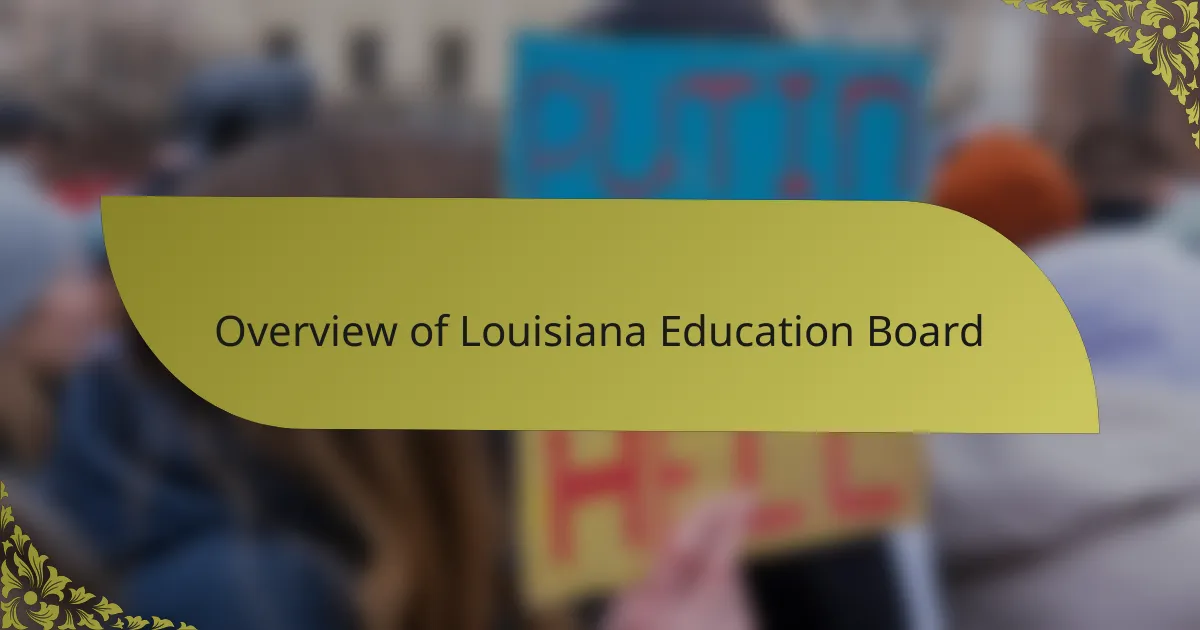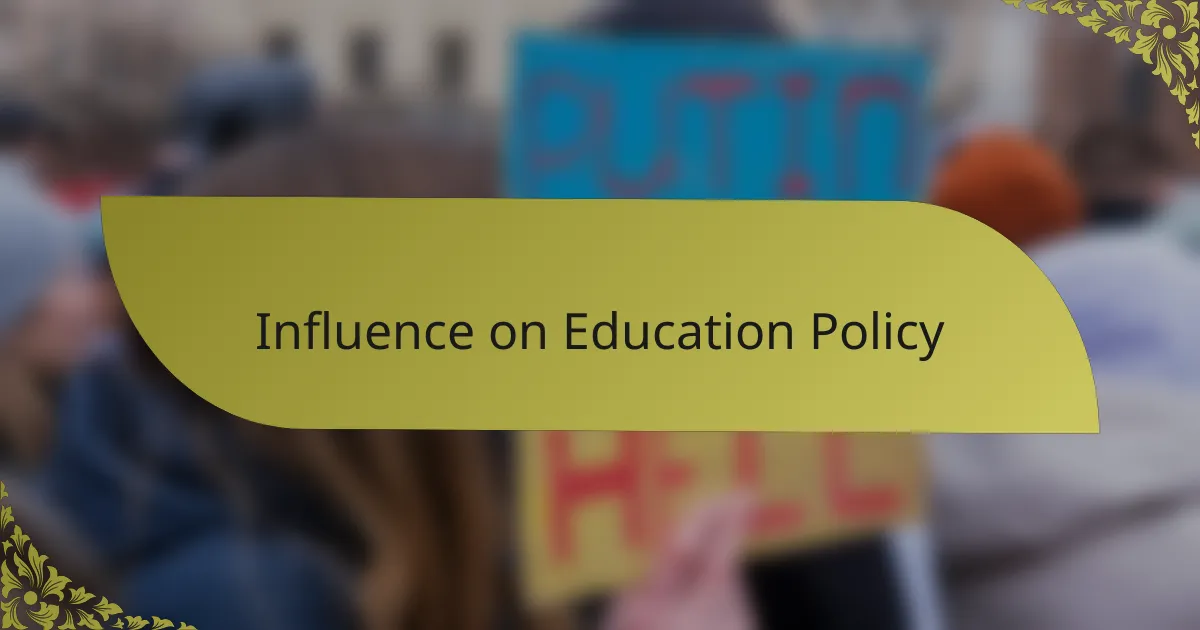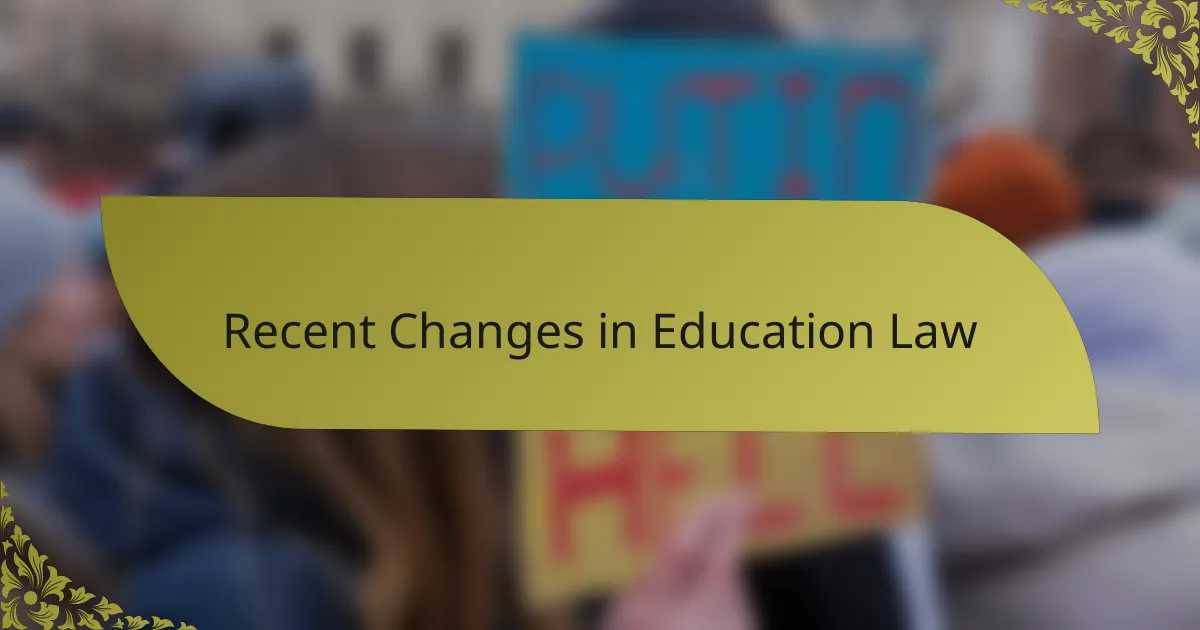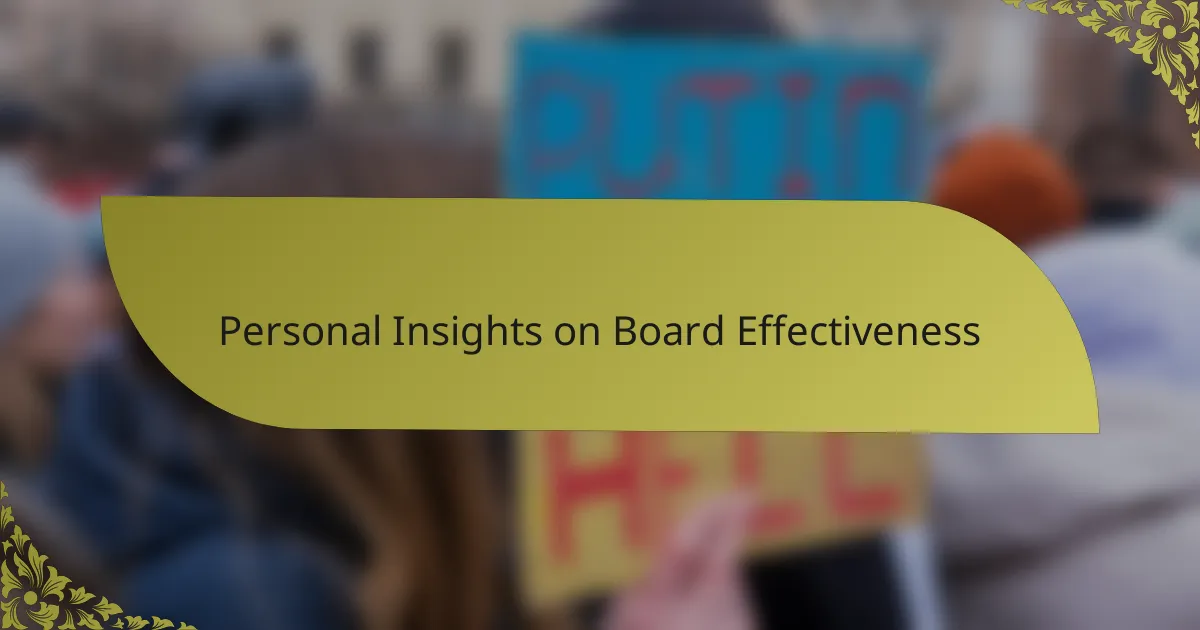Key takeaways
- The Louisiana Board of Elementary and Secondary Education (BESE) is crucial for setting education policies, standards, and managing funding, directly impacting students and teachers.
- Recent education law changes include increased technology funding, stricter teacher certification requirements, and a new standardized testing system to better assess student performance.
- Community engagement and feedback in decision-making processes are vital for improving educational outcomes and ensuring policies meet the needs of educators and families.
- Suggestions for improvement include enhancing parent and teacher involvement, conducting regular community forums, and advocating for equity in education through increased funding for underserved schools.

Overview of Louisiana Education Board
The Louisiana Board of Elementary and Secondary Education (BESE) plays a crucial role in shaping the educational landscape of our state. I often find myself reflecting on how their decisions impact students and teachers alike, especially when I see the direct effects in classrooms. Have you ever wondered how policies formulated at such a high level translate into real-life learning experiences for children?
At its core, BESE is responsible for overseeing public elementary and secondary education in Louisiana. This includes setting policies, establishing educational standards, and managing the financial aspects of education funding. I can’t help but feel a sense of urgency about how these policies can uplift or hinder our education system, particularly in underserved communities.
What’s fascinating is how the board is composed of elected members, which gives the community a voice in educational governance. It provides a unique opportunity for parents and educators to influence decisions that truly matter. With my own experiences in education, I often think about how essential it is for these members to understand the daily challenges faced by schools and communities as they embark on this responsibility.

Role of Board in Governance
The Board of Elementary and Secondary Education (BESE) plays a crucial role in shaping the educational landscape of Louisiana. I often see how their decisions affect not just schools but entire communities. For instance, when BESE implements new policies or standards, it can lead to significant changes in how students are taught and assessed.
What strikes me about BESE is their responsibility to ensure that educational policies align with the needs of diverse student populations. This involves evaluating curricula, setting academic standards, and managing budgets, which I believe directly influences the quality of education our children receive. I recall discussing with local educators how BESE’s actions can uplift or hinder innovation in our schools, reflecting the board’s essential role in governance.
Here’s a comparative look at some key responsibilities of the Board:
| Responsibility | Description |
|---|---|
| Policy Development | Formulates educational policies that guide K-12 education. |
| Budget Management | Oversees the distribution of funds to school districts. |
| Accountability Measures | Ensures schools meet performance standards. |

Influence on Education Policy
The influence of BESE on education policy is profound and often felt in ways I didn’t fully comprehend until I started working closely with educators. For instance, when they introduced new assessments, it wasn’t just a shift for teachers; it created ripple effects that altered how students interacted with their learning environment. Have you ever noticed how a single policy change can make or break a teaching strategy?
I remember a discussion I had with a teacher friend about the impact of funding policies. When BESE reallocates budgets, it can mean the difference between a well-resourced classroom and one that struggles to meet even basic needs. This firsthand experience highlights the board’s crucial role in ensuring equitable access to quality education, particularly for those students in underserved areas.
Moreover, the board’s decision-making process often feels distant from the realities faced in schools. I sometimes find myself wondering how deeply the elected members understand the daily struggles that educators encounter. Their ability to bridge this gap could transform our education system, making it more responsive to the actual needs of students and teachers alike.

Recent Changes in Education Law
Recent changes in education law in Louisiana have sparked quite a debate within the community. I remember attending a school board meeting where parents expressed their concerns about how new policies would impact their children. It’s essential to consider that these laws don’t just change the curriculum—they can reshape the entire learning environment for our young learners.
The most notable changes include:
- Increased funding for technology in classrooms to prepare students for a digital future.
- Implementation of stricter requirements for teacher certification to ensure quality education.
- Introduction of a new standardized testing system aimed at better assessing student performance.
- Adjustments to school accountability measures that prioritize student growth over raw test scores.
- Enhanced support for special education programs to meet diverse learners’ needs.
These reforms can be a double-edged sword, bringing progress while also prompting valid concerns from those affected.

Personal Insights on Board Effectiveness
Reflecting on the effectiveness of the Board of Elementary and Secondary Education (BESE), I find that they wield considerable influence over the educational landscape in Louisiana. From my experience attending board meetings, I’ve seen firsthand how passionate members can spark meaningful discussions around improving educational standards. However, there are moments when the board’s decisions seem disconnected from the needs expressed by local educators and families, which can be frustrating.
It often feels like the voices of parents and teachers are overshadowed by politics. I recall a specific meeting where a proposed change to the curriculum had little to no input from classroom teachers. It made me wonder—how can we expect improved outcomes if the people directly involved are not part of the conversation?
Here’s a simple comparison of some strengths and weaknesses I’ve observed with the board:
| Strengths | Weaknesses |
|---|---|
| Commitment to improving education | Occasional disconnect with educators |
| Ability to enact policy changes | Lack of community input |
| Focus on statewide standards | Varied implementation across districts |

Suggestions for Improvement
When I think about the Board of Elementary and Secondary Education (BESE), I often notice areas that could benefit from improvement. For example, incorporating more community feedback in decision-making processes could foster greater trust and transparency. In my experience, when parents and educators feel their voices are heard, it creates a stronger bond between the school system and the community, ultimately enhancing student outcomes.
To drive meaningful change, I suggest the following improvements for BESE:
- Increase opportunities for parent and teacher input on curriculum changes.
- Implement regular community forums to discuss educational needs and challenges.
- Expand professional development programs for teachers, focusing on innovative teaching methods.
- Enhance data transparency, allowing stakeholders to access information on school performance.
- Advocate for increased funding for underserved schools to promote equity in education.
These changes can make a significant difference in how education is experienced in Louisiana, and it starts with listening to those directly affected.